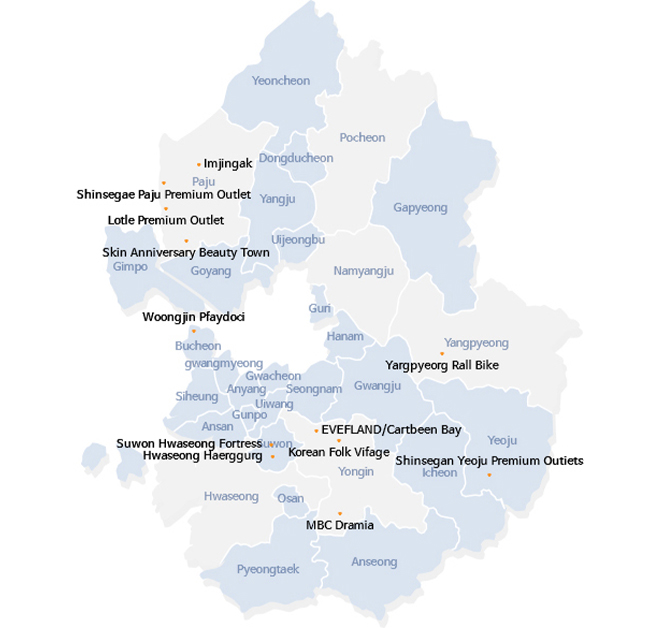General Information

The Republic of Korea is surrounded by seas on three sides,
and Seoul is in the west of the country, with Hangang River Stretching across it.
A number of bridges are connecting the southern and northern part of the city, boasting beautiful sceneries of their own.
Also, Seoul, the heart of the nation and home to 10 million national and foreign residents, is a world-class city where contemporary lifestyle meets long-standing history.
Seoul houses 266 cultural properties including five grand royal palaces, and is also a proud epicenter of the “Korean Wave” pop culture that is adored by many.
Every corner of the city is packed with friendly residents and extraordinary restaurants, teeming with modern streetscapes and dashing natural landscapes.
Seoul indeed is a place of boundless discoveries, where no two visits are alike.
Geographically, Gyeonggi-do surrounds Seoul, the capital city of the Republic of Korea and is the center and the economic hub of the country.
With two airports and two ports, it allows easy access to any city in Northeast Asia within two hours.
Gyeonggi-do is where the tour in Korea begins.
From prehistoric times through Baekje, Goryeo and Joseon Dynasties, which had maintained the royal road through the region, Korea’s leading industries like IT, auto industry and tourism have flourished here.

Time Difference / Business Hours
Time Difference / Business Hours Korean time is 9 hours ahead of Greenwich Mean Time (GMT+9). / No daylight savings time
Business hours for banks are generally from 09:30 to 16:30 on weekdays only. Banks are closed on Saturdays, Sundays and public holidays. ATMs are widely available. Major department stores are open from 10:30 to 19:30, including Sundays, but smaller shops tend to open earlier and close later every day.

International Call
International dialing code in Korea is +82. Please omit (0) when dialing from overseas.

Currency and Bank
1) Currency
Major foreign currencies that can be exchanged at banks, hotels, and the airport include the US Dollar, Japanese Yen, Euro, and UK Sterling. Most hotels, restaurants, and shops accept major international credit cards including Visa, American Express, Diners Club, Master Card, and JBC. Foreign-issued ATM cards may have limited use.
*About Won(KRW) Korea’s currency is the won. There are 1,000, 5,000, 10,000, and 50,000 won bills. Coins come in 1, 5, 10, 100, and 500 won.
| Old Bills | ||
|---|---|---|

10,000 won (man won) |

5,000 won (ocheon won) |

1,000 won (cheon won) |
| New Bills | |||
|---|---|---|---|

10,000 won (man won) |

5,000 won (ocheon won) |

1,000 won (cheon won) |

50,000 won (oman won) |
| Coins | |||
|---|---|---|---|

500 won (obaek won) |

100 won (baek won) |

50 won (osip won) |

10 won (sip won) |
2) Bank
Banks can offer some of the best exchange rates to travelers. Banking hours can vary, but most business hours are from 09:00 to 16:00. ATMs typically operate until 23:00, but many are open 24 hours. ATMs can also be found at convenient stores, but generally charge a higher transaction fee. ATMs that accept international cards are common, especially in areas frequented by foreigners; look for ATMs with a “Global” sign or the logo of your bank. Global ATMs offer multi-languages.
3) Card
Diners Club, Visa, American Express and MasterCard are widely accepted at major hotels, shops and restaurants in the larger cities. Check with your credit card company for details of merchant acceptability and other services which may be available.
4) Traveler's Check
Accepted, but may be difficult to change in smaller towns. To avoid additional exchange rate charges, travelers are advised to take Traveler's check in US Dollars. The exchange of foreign currencies may be made at Incheon International Airport.

Tax
Value-added tax (VAT) is levied on most goods and services at a standard rate of 10% and is included in the retail price. In tourist hotels, this 10% tax applies to meals and other services and is added into the bill.

Gratuities (Tipping)
Tipping is not a traditional custom in Korea. A 10% service charge will be added to your bill at all tourist restaurants and hotels. It is also not necessary to tip a taxi driver unless he assists you with luggage or provides an extra service.

Electricity
In Korea, electrical outlets are operated at 220 volt only. Overseas delegates bringing laptop computers and other electrical appliances are advised to check whether a transformer is required

Language
Hangeul (한글), Korea's official alphabet, was first invented by King Sejong during the Joseon Dynasty. Originally called Hunminjeongeum (훈민정음), the language was conceived in 1443, and further promulgated by the King in 1446. At the time of its inception, the language consisted of 17 consonants and 11 vowels however, since then, 3 of the originally established consonants and 1 vowel have fallen into disuse bringing the total number of characters to 24. Syllables are formed by the selective combination of vowels and consonants to create words.

Emergency & Useful Contacts in Korea
| Emergency calls (24 hours) |
|---|
|
| For visitors from overseas |
|---|
|

Useful Website
- Korea Tourism Organization : http://www.visitkorea.or.kr
- Gateway to Korea : http://www.korea.net
- Seoul Tourism Organization : http://www.miceseoul.com
- Seoul Metropolitan Government : http://www.visitseoul.net
- Korea Immigration Service : http://www.mofa.go.kr/eng/index.do
- Ministry of Foreign Affairs and Trade : http://www.mofat.go.kr
- Incheon International Airport : https://www.airport.kr/ap/en/index.do
- Gimpo International Airport : http://www.airport.co.kr/gimpoeng/main.do